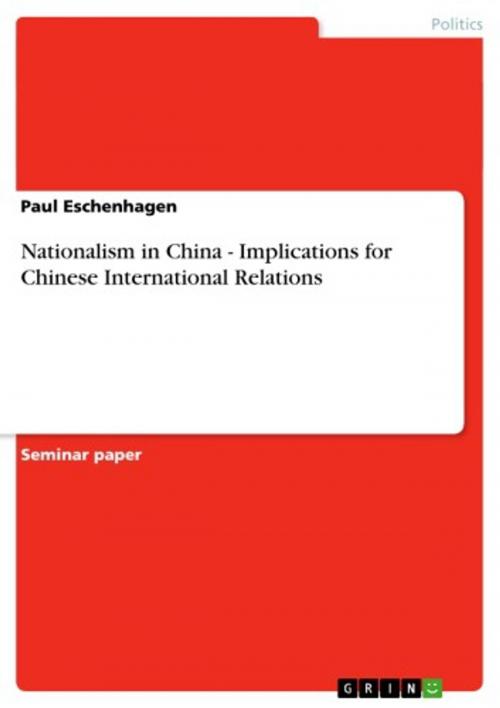Nationalism in China - Implications for Chinese International Relations
Implications for Chinese International Relations
Nonfiction, Social & Cultural Studies, Political Science, International, International Relations| Author: | Paul Eschenhagen | ISBN: | 9783638532136 |
| Publisher: | GRIN Verlag | Publication: | August 9, 2006 |
| Imprint: | GRIN Verlag | Language: | English |
| Author: | Paul Eschenhagen |
| ISBN: | 9783638532136 |
| Publisher: | GRIN Verlag |
| Publication: | August 9, 2006 |
| Imprint: | GRIN Verlag |
| Language: | English |
Seminar paper from the year 2006 in the subject Politics - International Politics - Region: Far East, grade: 1,3, Johannes Gutenberg University Mainz (Institut für Politikwissenschaft), course: China in World Politics, 42 entries in the bibliography, language: English, abstract: In the past, Chinese nationalism has shown great flexibility as a connection of contradiction, interaction, and integration between the Communist Party, state and society, between the ruling ideology and intellectual discourse. Nationalism had great effect on the ways Chinese leaders and people behaved in domestic affairs, but also on the stage of international relations. Chinese nationalist thinking is not a uniform and unchanging phenomenon, as some Western analysts suggest, but a complex phenomenon with different layers which have to be analyzed in their complexity to come to a conclusion.
Seminar paper from the year 2006 in the subject Politics - International Politics - Region: Far East, grade: 1,3, Johannes Gutenberg University Mainz (Institut für Politikwissenschaft), course: China in World Politics, 42 entries in the bibliography, language: English, abstract: In the past, Chinese nationalism has shown great flexibility as a connection of contradiction, interaction, and integration between the Communist Party, state and society, between the ruling ideology and intellectual discourse. Nationalism had great effect on the ways Chinese leaders and people behaved in domestic affairs, but also on the stage of international relations. Chinese nationalist thinking is not a uniform and unchanging phenomenon, as some Western analysts suggest, but a complex phenomenon with different layers which have to be analyzed in their complexity to come to a conclusion.















